Agency in Business Law: Types, Roles, and Principal-Agent Relationship
VerifiedAdded on 2020/01/23
|10
|3930
|155
Report
AI Summary
This report provides a comprehensive overview of the law of agency, a critical area of commercial law, particularly within the UK context. It defines agency as a consensual, fiduciary relationship where an agent acts on behalf of a principal, creating legal relations with third parties. The report details the different types of agents, including general agents, special agents, subagents, and servants, along with their respective authorities and responsibilities. It also explores the roles and duties of agents, emphasizing the importance of acting in the principal's best interest, avoiding conflicts of interest, and refraining from making secret profits. Case examples such as Ireland v Livingstone and Freeman & Lockyer v Buckhurst Park Properties Ltd illustrate key concepts like actual and apparent authority. The report underscores the significance of agency law for consistent business management and provides a detailed analysis of the principal-agent relationship, outlining the duties owed by agents and the legal implications of their actions.
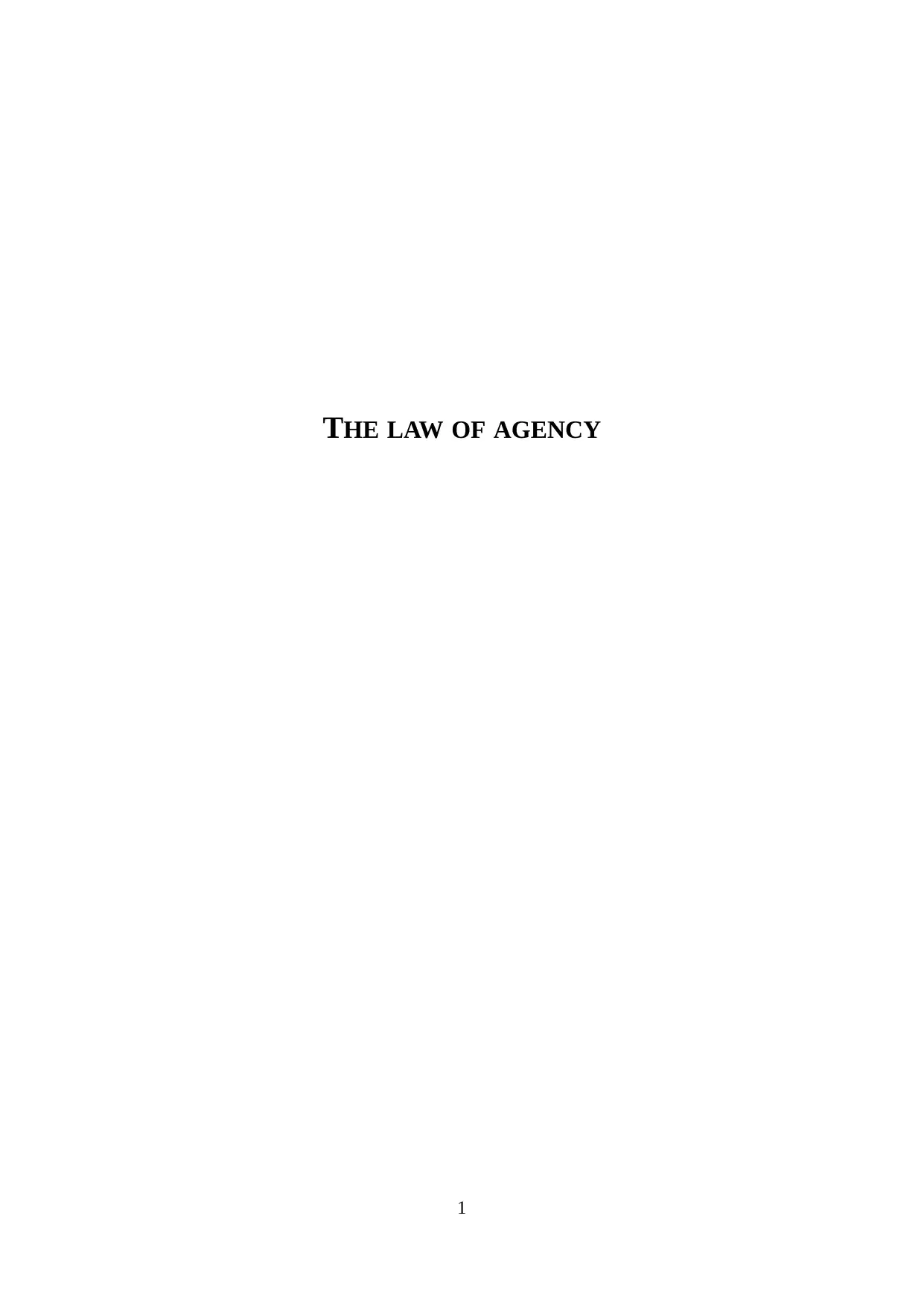
THE LAW OF AGENCY
1
1
Paraphrase This Document
Need a fresh take? Get an instant paraphrase of this document with our AI Paraphraser

Table of Contents
Agency (Generalized overview with case examples)...........................................................................3
Types of agents.....................................................................................................................................4
Roles and Duties of Agents in business law.........................................................................................5
Principal – Agent Relationship.............................................................................................................7
Agency created by agreement .........................................................................................................7
Agency created by the operation of Law.........................................................................................8
References............................................................................................................................................9
2
Agency (Generalized overview with case examples)...........................................................................3
Types of agents.....................................................................................................................................4
Roles and Duties of Agents in business law.........................................................................................5
Principal – Agent Relationship.............................................................................................................7
Agency created by agreement .........................................................................................................7
Agency created by the operation of Law.........................................................................................8
References............................................................................................................................................9
2
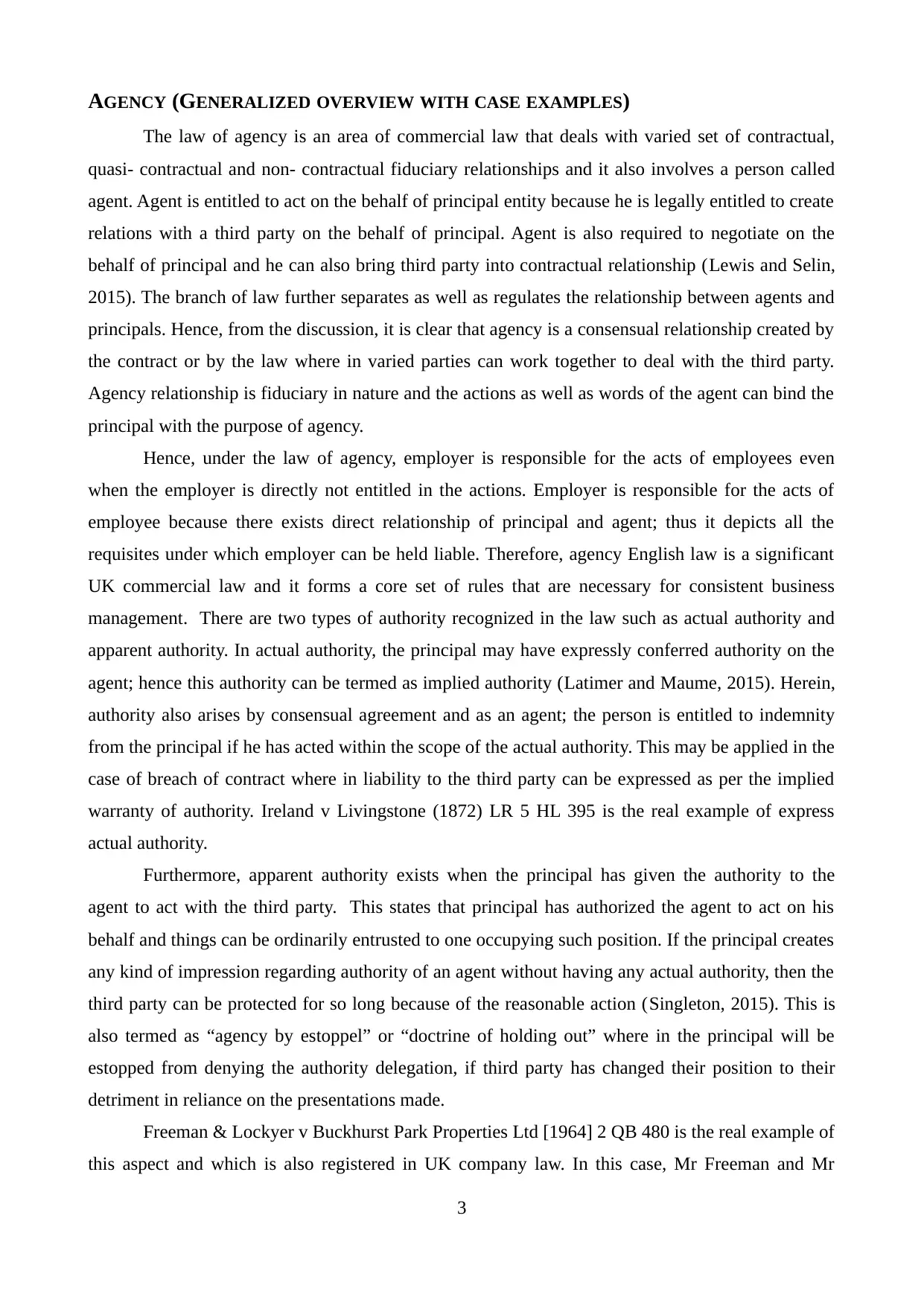
AGENCY (GENERALIZED OVERVIEW WITH CASE EXAMPLES)
The law of agency is an area of commercial law that deals with varied set of contractual,
quasi- contractual and non- contractual fiduciary relationships and it also involves a person called
agent. Agent is entitled to act on the behalf of principal entity because he is legally entitled to create
relations with a third party on the behalf of principal. Agent is also required to negotiate on the
behalf of principal and he can also bring third party into contractual relationship (Lewis and Selin,
2015). The branch of law further separates as well as regulates the relationship between agents and
principals. Hence, from the discussion, it is clear that agency is a consensual relationship created by
the contract or by the law where in varied parties can work together to deal with the third party.
Agency relationship is fiduciary in nature and the actions as well as words of the agent can bind the
principal with the purpose of agency.
Hence, under the law of agency, employer is responsible for the acts of employees even
when the employer is directly not entitled in the actions. Employer is responsible for the acts of
employee because there exists direct relationship of principal and agent; thus it depicts all the
requisites under which employer can be held liable. Therefore, agency English law is a significant
UK commercial law and it forms a core set of rules that are necessary for consistent business
management. There are two types of authority recognized in the law such as actual authority and
apparent authority. In actual authority, the principal may have expressly conferred authority on the
agent; hence this authority can be termed as implied authority (Latimer and Maume, 2015). Herein,
authority also arises by consensual agreement and as an agent; the person is entitled to indemnity
from the principal if he has acted within the scope of the actual authority. This may be applied in the
case of breach of contract where in liability to the third party can be expressed as per the implied
warranty of authority. Ireland v Livingstone (1872) LR 5 HL 395 is the real example of express
actual authority.
Furthermore, apparent authority exists when the principal has given the authority to the
agent to act with the third party. This states that principal has authorized the agent to act on his
behalf and things can be ordinarily entrusted to one occupying such position. If the principal creates
any kind of impression regarding authority of an agent without having any actual authority, then the
third party can be protected for so long because of the reasonable action (Singleton, 2015). This is
also termed as “agency by estoppel” or “doctrine of holding out” where in the principal will be
estopped from denying the authority delegation, if third party has changed their position to their
detriment in reliance on the presentations made.
Freeman & Lockyer v Buckhurst Park Properties Ltd [1964] 2 QB 480 is the real example of
this aspect and which is also registered in UK company law. In this case, Mr Freeman and Mr
3
The law of agency is an area of commercial law that deals with varied set of contractual,
quasi- contractual and non- contractual fiduciary relationships and it also involves a person called
agent. Agent is entitled to act on the behalf of principal entity because he is legally entitled to create
relations with a third party on the behalf of principal. Agent is also required to negotiate on the
behalf of principal and he can also bring third party into contractual relationship (Lewis and Selin,
2015). The branch of law further separates as well as regulates the relationship between agents and
principals. Hence, from the discussion, it is clear that agency is a consensual relationship created by
the contract or by the law where in varied parties can work together to deal with the third party.
Agency relationship is fiduciary in nature and the actions as well as words of the agent can bind the
principal with the purpose of agency.
Hence, under the law of agency, employer is responsible for the acts of employees even
when the employer is directly not entitled in the actions. Employer is responsible for the acts of
employee because there exists direct relationship of principal and agent; thus it depicts all the
requisites under which employer can be held liable. Therefore, agency English law is a significant
UK commercial law and it forms a core set of rules that are necessary for consistent business
management. There are two types of authority recognized in the law such as actual authority and
apparent authority. In actual authority, the principal may have expressly conferred authority on the
agent; hence this authority can be termed as implied authority (Latimer and Maume, 2015). Herein,
authority also arises by consensual agreement and as an agent; the person is entitled to indemnity
from the principal if he has acted within the scope of the actual authority. This may be applied in the
case of breach of contract where in liability to the third party can be expressed as per the implied
warranty of authority. Ireland v Livingstone (1872) LR 5 HL 395 is the real example of express
actual authority.
Furthermore, apparent authority exists when the principal has given the authority to the
agent to act with the third party. This states that principal has authorized the agent to act on his
behalf and things can be ordinarily entrusted to one occupying such position. If the principal creates
any kind of impression regarding authority of an agent without having any actual authority, then the
third party can be protected for so long because of the reasonable action (Singleton, 2015). This is
also termed as “agency by estoppel” or “doctrine of holding out” where in the principal will be
estopped from denying the authority delegation, if third party has changed their position to their
detriment in reliance on the presentations made.
Freeman & Lockyer v Buckhurst Park Properties Ltd [1964] 2 QB 480 is the real example of
this aspect and which is also registered in UK company law. In this case, Mr Freeman and Mr
3
⊘ This is a preview!⊘
Do you want full access?
Subscribe today to unlock all pages.

Trusted by 1+ million students worldwide
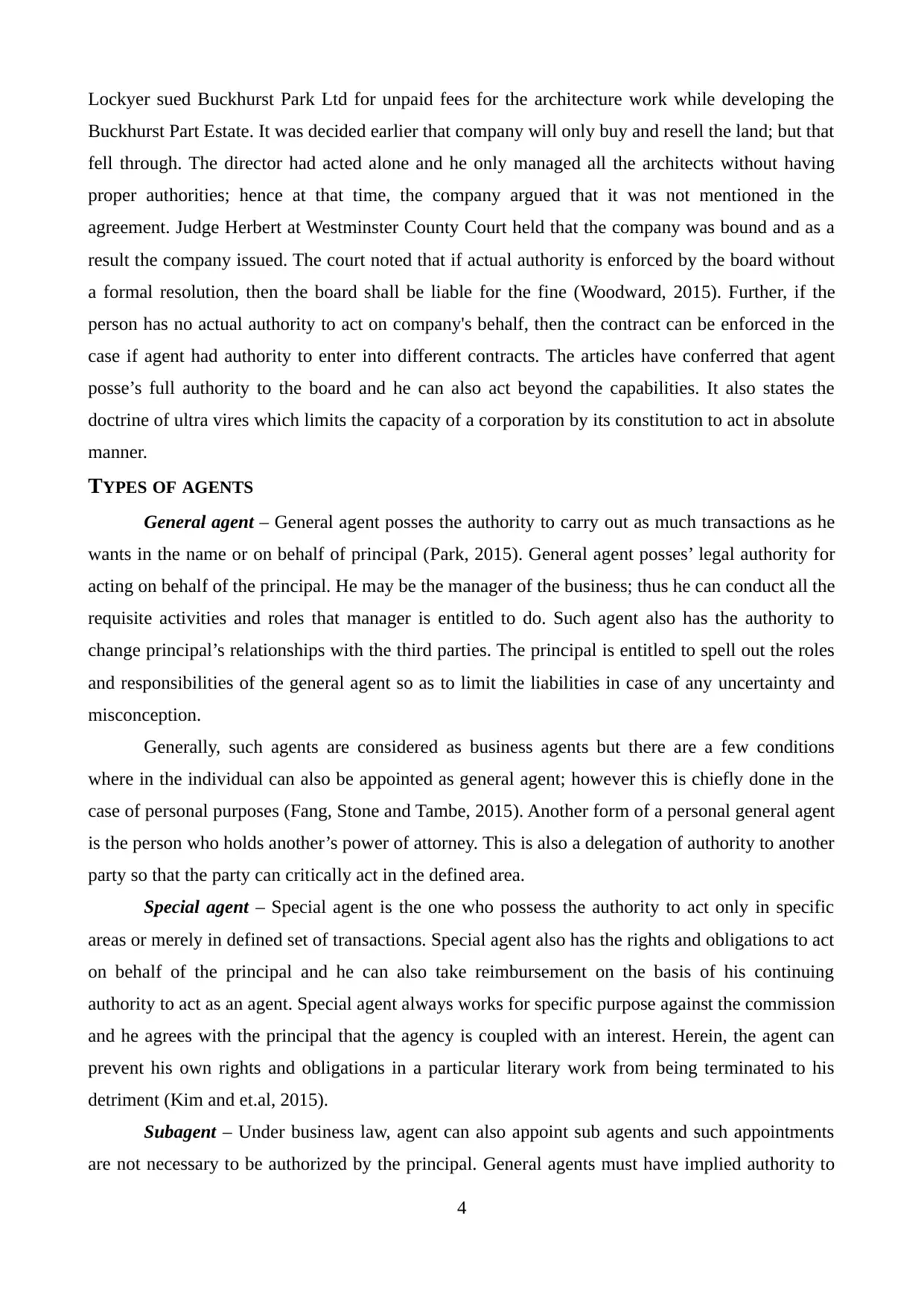
Lockyer sued Buckhurst Park Ltd for unpaid fees for the architecture work while developing the
Buckhurst Part Estate. It was decided earlier that company will only buy and resell the land; but that
fell through. The director had acted alone and he only managed all the architects without having
proper authorities; hence at that time, the company argued that it was not mentioned in the
agreement. Judge Herbert at Westminster County Court held that the company was bound and as a
result the company issued. The court noted that if actual authority is enforced by the board without
a formal resolution, then the board shall be liable for the fine (Woodward, 2015). Further, if the
person has no actual authority to act on company's behalf, then the contract can be enforced in the
case if agent had authority to enter into different contracts. The articles have conferred that agent
posse’s full authority to the board and he can also act beyond the capabilities. It also states the
doctrine of ultra vires which limits the capacity of a corporation by its constitution to act in absolute
manner.
TYPES OF AGENTS
General agent – General agent posses the authority to carry out as much transactions as he
wants in the name or on behalf of principal (Park, 2015). General agent posses’ legal authority for
acting on behalf of the principal. He may be the manager of the business; thus he can conduct all the
requisite activities and roles that manager is entitled to do. Such agent also has the authority to
change principal’s relationships with the third parties. The principal is entitled to spell out the roles
and responsibilities of the general agent so as to limit the liabilities in case of any uncertainty and
misconception.
Generally, such agents are considered as business agents but there are a few conditions
where in the individual can also be appointed as general agent; however this is chiefly done in the
case of personal purposes (Fang, Stone and Tambe, 2015). Another form of a personal general agent
is the person who holds another’s power of attorney. This is also a delegation of authority to another
party so that the party can critically act in the defined area.
Special agent – Special agent is the one who possess the authority to act only in specific
areas or merely in defined set of transactions. Special agent also has the rights and obligations to act
on behalf of the principal and he can also take reimbursement on the basis of his continuing
authority to act as an agent. Special agent always works for specific purpose against the commission
and he agrees with the principal that the agency is coupled with an interest. Herein, the agent can
prevent his own rights and obligations in a particular literary work from being terminated to his
detriment (Kim and et.al, 2015).
Subagent – Under business law, agent can also appoint sub agents and such appointments
are not necessary to be authorized by the principal. General agents must have implied authority to
4
Buckhurst Part Estate. It was decided earlier that company will only buy and resell the land; but that
fell through. The director had acted alone and he only managed all the architects without having
proper authorities; hence at that time, the company argued that it was not mentioned in the
agreement. Judge Herbert at Westminster County Court held that the company was bound and as a
result the company issued. The court noted that if actual authority is enforced by the board without
a formal resolution, then the board shall be liable for the fine (Woodward, 2015). Further, if the
person has no actual authority to act on company's behalf, then the contract can be enforced in the
case if agent had authority to enter into different contracts. The articles have conferred that agent
posse’s full authority to the board and he can also act beyond the capabilities. It also states the
doctrine of ultra vires which limits the capacity of a corporation by its constitution to act in absolute
manner.
TYPES OF AGENTS
General agent – General agent posses the authority to carry out as much transactions as he
wants in the name or on behalf of principal (Park, 2015). General agent posses’ legal authority for
acting on behalf of the principal. He may be the manager of the business; thus he can conduct all the
requisite activities and roles that manager is entitled to do. Such agent also has the authority to
change principal’s relationships with the third parties. The principal is entitled to spell out the roles
and responsibilities of the general agent so as to limit the liabilities in case of any uncertainty and
misconception.
Generally, such agents are considered as business agents but there are a few conditions
where in the individual can also be appointed as general agent; however this is chiefly done in the
case of personal purposes (Fang, Stone and Tambe, 2015). Another form of a personal general agent
is the person who holds another’s power of attorney. This is also a delegation of authority to another
party so that the party can critically act in the defined area.
Special agent – Special agent is the one who possess the authority to act only in specific
areas or merely in defined set of transactions. Special agent also has the rights and obligations to act
on behalf of the principal and he can also take reimbursement on the basis of his continuing
authority to act as an agent. Special agent always works for specific purpose against the commission
and he agrees with the principal that the agency is coupled with an interest. Herein, the agent can
prevent his own rights and obligations in a particular literary work from being terminated to his
detriment (Kim and et.al, 2015).
Subagent – Under business law, agent can also appoint sub agents and such appointments
are not necessary to be authorized by the principal. General agents must have implied authority to
4
Paraphrase This Document
Need a fresh take? Get an instant paraphrase of this document with our AI Paraphraser
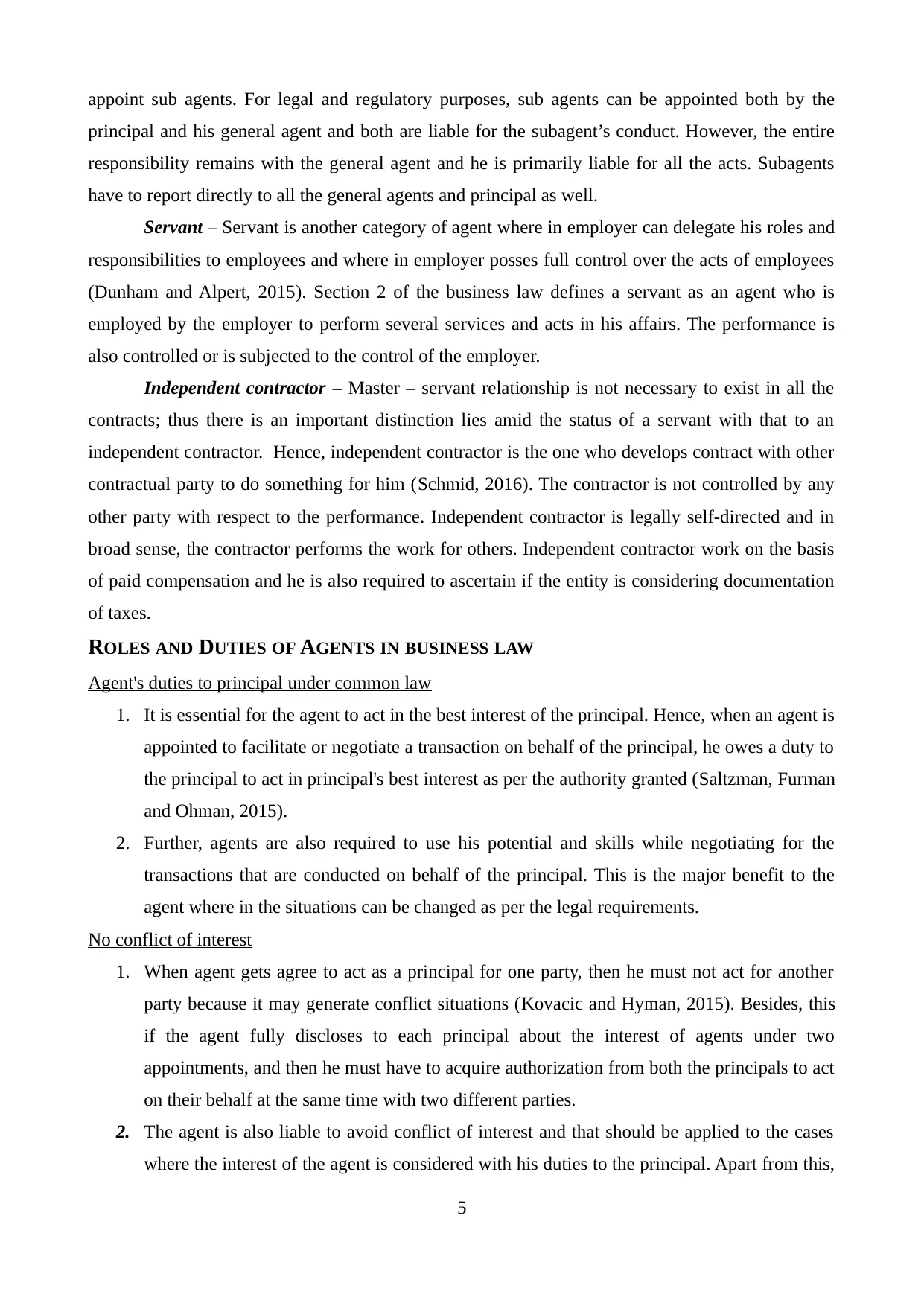
appoint sub agents. For legal and regulatory purposes, sub agents can be appointed both by the
principal and his general agent and both are liable for the subagent’s conduct. However, the entire
responsibility remains with the general agent and he is primarily liable for all the acts. Subagents
have to report directly to all the general agents and principal as well.
Servant – Servant is another category of agent where in employer can delegate his roles and
responsibilities to employees and where in employer posses full control over the acts of employees
(Dunham and Alpert, 2015). Section 2 of the business law defines a servant as an agent who is
employed by the employer to perform several services and acts in his affairs. The performance is
also controlled or is subjected to the control of the employer.
Independent contractor – Master – servant relationship is not necessary to exist in all the
contracts; thus there is an important distinction lies amid the status of a servant with that to an
independent contractor. Hence, independent contractor is the one who develops contract with other
contractual party to do something for him (Schmid, 2016). The contractor is not controlled by any
other party with respect to the performance. Independent contractor is legally self-directed and in
broad sense, the contractor performs the work for others. Independent contractor work on the basis
of paid compensation and he is also required to ascertain if the entity is considering documentation
of taxes.
ROLES AND DUTIES OF AGENTS IN BUSINESS LAW
Agent's duties to principal under common law
1. It is essential for the agent to act in the best interest of the principal. Hence, when an agent is
appointed to facilitate or negotiate a transaction on behalf of the principal, he owes a duty to
the principal to act in principal's best interest as per the authority granted (Saltzman, Furman
and Ohman, 2015).
2. Further, agents are also required to use his potential and skills while negotiating for the
transactions that are conducted on behalf of the principal. This is the major benefit to the
agent where in the situations can be changed as per the legal requirements.
No conflict of interest
1. When agent gets agree to act as a principal for one party, then he must not act for another
party because it may generate conflict situations (Kovacic and Hyman, 2015). Besides, this
if the agent fully discloses to each principal about the interest of agents under two
appointments, and then he must have to acquire authorization from both the principals to act
on their behalf at the same time with two different parties.
2. The agent is also liable to avoid conflict of interest and that should be applied to the cases
where the interest of the agent is considered with his duties to the principal. Apart from this,
5
principal and his general agent and both are liable for the subagent’s conduct. However, the entire
responsibility remains with the general agent and he is primarily liable for all the acts. Subagents
have to report directly to all the general agents and principal as well.
Servant – Servant is another category of agent where in employer can delegate his roles and
responsibilities to employees and where in employer posses full control over the acts of employees
(Dunham and Alpert, 2015). Section 2 of the business law defines a servant as an agent who is
employed by the employer to perform several services and acts in his affairs. The performance is
also controlled or is subjected to the control of the employer.
Independent contractor – Master – servant relationship is not necessary to exist in all the
contracts; thus there is an important distinction lies amid the status of a servant with that to an
independent contractor. Hence, independent contractor is the one who develops contract with other
contractual party to do something for him (Schmid, 2016). The contractor is not controlled by any
other party with respect to the performance. Independent contractor is legally self-directed and in
broad sense, the contractor performs the work for others. Independent contractor work on the basis
of paid compensation and he is also required to ascertain if the entity is considering documentation
of taxes.
ROLES AND DUTIES OF AGENTS IN BUSINESS LAW
Agent's duties to principal under common law
1. It is essential for the agent to act in the best interest of the principal. Hence, when an agent is
appointed to facilitate or negotiate a transaction on behalf of the principal, he owes a duty to
the principal to act in principal's best interest as per the authority granted (Saltzman, Furman
and Ohman, 2015).
2. Further, agents are also required to use his potential and skills while negotiating for the
transactions that are conducted on behalf of the principal. This is the major benefit to the
agent where in the situations can be changed as per the legal requirements.
No conflict of interest
1. When agent gets agree to act as a principal for one party, then he must not act for another
party because it may generate conflict situations (Kovacic and Hyman, 2015). Besides, this
if the agent fully discloses to each principal about the interest of agents under two
appointments, and then he must have to acquire authorization from both the principals to act
on their behalf at the same time with two different parties.
2. The agent is also liable to avoid conflict of interest and that should be applied to the cases
where the interest of the agent is considered with his duties to the principal. Apart from this,
5
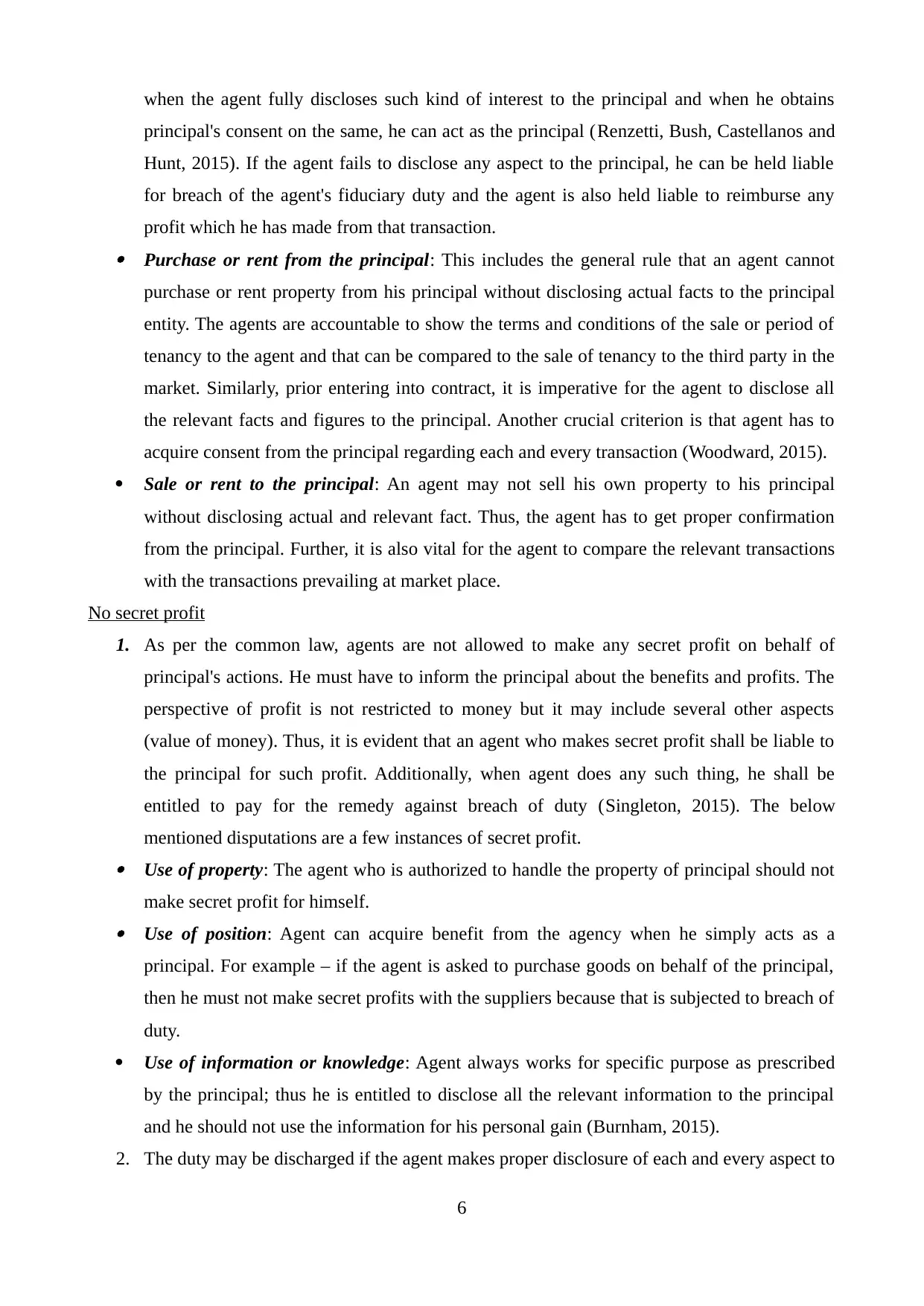
when the agent fully discloses such kind of interest to the principal and when he obtains
principal's consent on the same, he can act as the principal (Renzetti, Bush, Castellanos and
Hunt, 2015). If the agent fails to disclose any aspect to the principal, he can be held liable
for breach of the agent's fiduciary duty and the agent is also held liable to reimburse any
profit which he has made from that transaction. Purchase or rent from the principal: This includes the general rule that an agent cannot
purchase or rent property from his principal without disclosing actual facts to the principal
entity. The agents are accountable to show the terms and conditions of the sale or period of
tenancy to the agent and that can be compared to the sale of tenancy to the third party in the
market. Similarly, prior entering into contract, it is imperative for the agent to disclose all
the relevant facts and figures to the principal. Another crucial criterion is that agent has to
acquire consent from the principal regarding each and every transaction (Woodward, 2015).
Sale or rent to the principal: An agent may not sell his own property to his principal
without disclosing actual and relevant fact. Thus, the agent has to get proper confirmation
from the principal. Further, it is also vital for the agent to compare the relevant transactions
with the transactions prevailing at market place.
No secret profit
1. As per the common law, agents are not allowed to make any secret profit on behalf of
principal's actions. He must have to inform the principal about the benefits and profits. The
perspective of profit is not restricted to money but it may include several other aspects
(value of money). Thus, it is evident that an agent who makes secret profit shall be liable to
the principal for such profit. Additionally, when agent does any such thing, he shall be
entitled to pay for the remedy against breach of duty (Singleton, 2015). The below
mentioned disputations are a few instances of secret profit. Use of property: The agent who is authorized to handle the property of principal should not
make secret profit for himself. Use of position: Agent can acquire benefit from the agency when he simply acts as a
principal. For example – if the agent is asked to purchase goods on behalf of the principal,
then he must not make secret profits with the suppliers because that is subjected to breach of
duty.
Use of information or knowledge: Agent always works for specific purpose as prescribed
by the principal; thus he is entitled to disclose all the relevant information to the principal
and he should not use the information for his personal gain (Burnham, 2015).
2. The duty may be discharged if the agent makes proper disclosure of each and every aspect to
6
principal's consent on the same, he can act as the principal (Renzetti, Bush, Castellanos and
Hunt, 2015). If the agent fails to disclose any aspect to the principal, he can be held liable
for breach of the agent's fiduciary duty and the agent is also held liable to reimburse any
profit which he has made from that transaction. Purchase or rent from the principal: This includes the general rule that an agent cannot
purchase or rent property from his principal without disclosing actual facts to the principal
entity. The agents are accountable to show the terms and conditions of the sale or period of
tenancy to the agent and that can be compared to the sale of tenancy to the third party in the
market. Similarly, prior entering into contract, it is imperative for the agent to disclose all
the relevant facts and figures to the principal. Another crucial criterion is that agent has to
acquire consent from the principal regarding each and every transaction (Woodward, 2015).
Sale or rent to the principal: An agent may not sell his own property to his principal
without disclosing actual and relevant fact. Thus, the agent has to get proper confirmation
from the principal. Further, it is also vital for the agent to compare the relevant transactions
with the transactions prevailing at market place.
No secret profit
1. As per the common law, agents are not allowed to make any secret profit on behalf of
principal's actions. He must have to inform the principal about the benefits and profits. The
perspective of profit is not restricted to money but it may include several other aspects
(value of money). Thus, it is evident that an agent who makes secret profit shall be liable to
the principal for such profit. Additionally, when agent does any such thing, he shall be
entitled to pay for the remedy against breach of duty (Singleton, 2015). The below
mentioned disputations are a few instances of secret profit. Use of property: The agent who is authorized to handle the property of principal should not
make secret profit for himself. Use of position: Agent can acquire benefit from the agency when he simply acts as a
principal. For example – if the agent is asked to purchase goods on behalf of the principal,
then he must not make secret profits with the suppliers because that is subjected to breach of
duty.
Use of information or knowledge: Agent always works for specific purpose as prescribed
by the principal; thus he is entitled to disclose all the relevant information to the principal
and he should not use the information for his personal gain (Burnham, 2015).
2. The duty may be discharged if the agent makes proper disclosure of each and every aspect to
6
⊘ This is a preview!⊘
Do you want full access?
Subscribe today to unlock all pages.

Trusted by 1+ million students worldwide
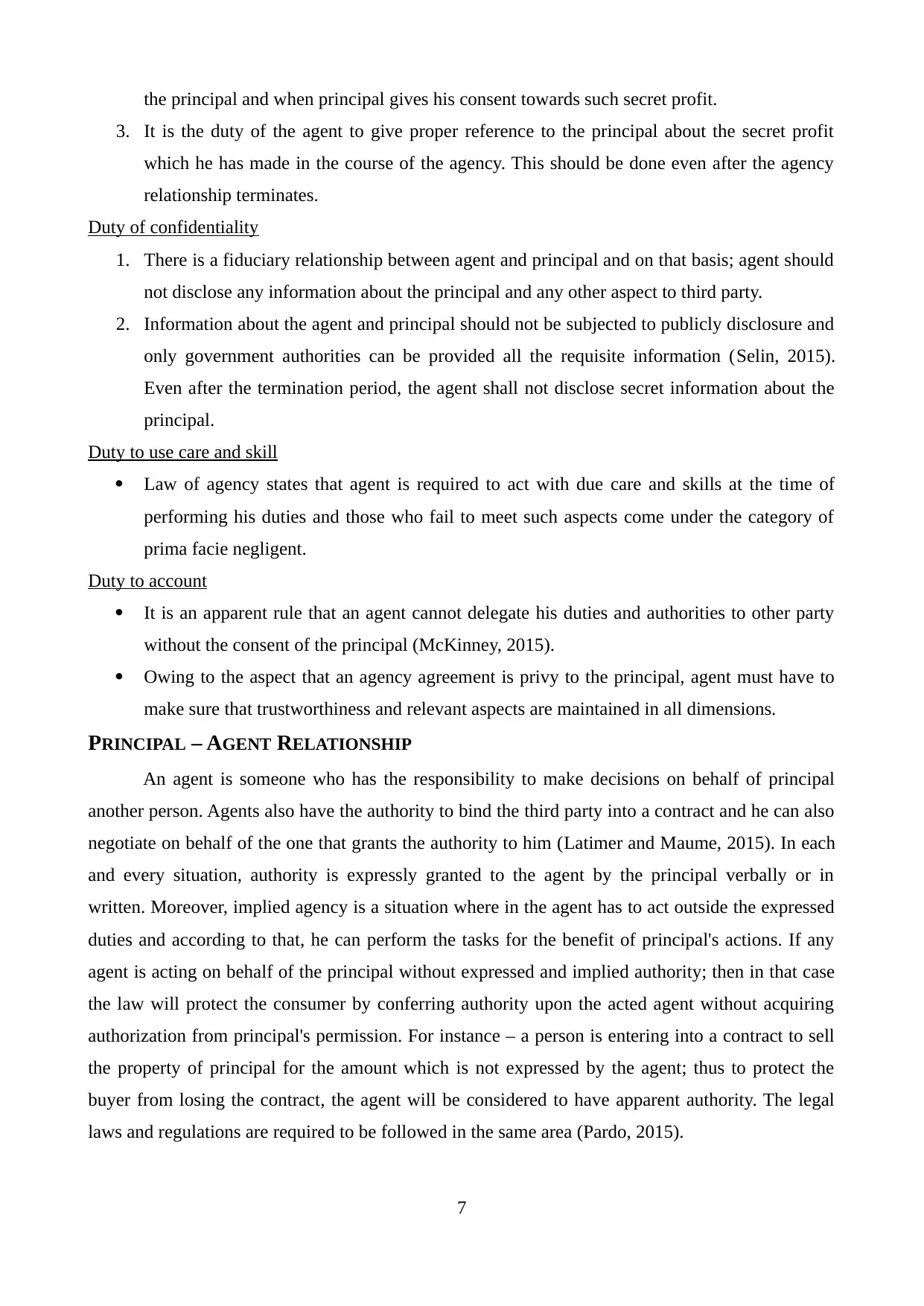
the principal and when principal gives his consent towards such secret profit.
3. It is the duty of the agent to give proper reference to the principal about the secret profit
which he has made in the course of the agency. This should be done even after the agency
relationship terminates.
Duty of confidentiality
1. There is a fiduciary relationship between agent and principal and on that basis; agent should
not disclose any information about the principal and any other aspect to third party.
2. Information about the agent and principal should not be subjected to publicly disclosure and
only government authorities can be provided all the requisite information (Selin, 2015).
Even after the termination period, the agent shall not disclose secret information about the
principal.
Duty to use care and skill
Law of agency states that agent is required to act with due care and skills at the time of
performing his duties and those who fail to meet such aspects come under the category of
prima facie negligent.
Duty to account
It is an apparent rule that an agent cannot delegate his duties and authorities to other party
without the consent of the principal (McKinney, 2015).
Owing to the aspect that an agency agreement is privy to the principal, agent must have to
make sure that trustworthiness and relevant aspects are maintained in all dimensions.
PRINCIPAL – AGENT RELATIONSHIP
An agent is someone who has the responsibility to make decisions on behalf of principal
another person. Agents also have the authority to bind the third party into a contract and he can also
negotiate on behalf of the one that grants the authority to him (Latimer and Maume, 2015). In each
and every situation, authority is expressly granted to the agent by the principal verbally or in
written. Moreover, implied agency is a situation where in the agent has to act outside the expressed
duties and according to that, he can perform the tasks for the benefit of principal's actions. If any
agent is acting on behalf of the principal without expressed and implied authority; then in that case
the law will protect the consumer by conferring authority upon the acted agent without acquiring
authorization from principal's permission. For instance – a person is entering into a contract to sell
the property of principal for the amount which is not expressed by the agent; thus to protect the
buyer from losing the contract, the agent will be considered to have apparent authority. The legal
laws and regulations are required to be followed in the same area (Pardo, 2015).
7
3. It is the duty of the agent to give proper reference to the principal about the secret profit
which he has made in the course of the agency. This should be done even after the agency
relationship terminates.
Duty of confidentiality
1. There is a fiduciary relationship between agent and principal and on that basis; agent should
not disclose any information about the principal and any other aspect to third party.
2. Information about the agent and principal should not be subjected to publicly disclosure and
only government authorities can be provided all the requisite information (Selin, 2015).
Even after the termination period, the agent shall not disclose secret information about the
principal.
Duty to use care and skill
Law of agency states that agent is required to act with due care and skills at the time of
performing his duties and those who fail to meet such aspects come under the category of
prima facie negligent.
Duty to account
It is an apparent rule that an agent cannot delegate his duties and authorities to other party
without the consent of the principal (McKinney, 2015).
Owing to the aspect that an agency agreement is privy to the principal, agent must have to
make sure that trustworthiness and relevant aspects are maintained in all dimensions.
PRINCIPAL – AGENT RELATIONSHIP
An agent is someone who has the responsibility to make decisions on behalf of principal
another person. Agents also have the authority to bind the third party into a contract and he can also
negotiate on behalf of the one that grants the authority to him (Latimer and Maume, 2015). In each
and every situation, authority is expressly granted to the agent by the principal verbally or in
written. Moreover, implied agency is a situation where in the agent has to act outside the expressed
duties and according to that, he can perform the tasks for the benefit of principal's actions. If any
agent is acting on behalf of the principal without expressed and implied authority; then in that case
the law will protect the consumer by conferring authority upon the acted agent without acquiring
authorization from principal's permission. For instance – a person is entering into a contract to sell
the property of principal for the amount which is not expressed by the agent; thus to protect the
buyer from losing the contract, the agent will be considered to have apparent authority. The legal
laws and regulations are required to be followed in the same area (Pardo, 2015).
7
Paraphrase This Document
Need a fresh take? Get an instant paraphrase of this document with our AI Paraphraser
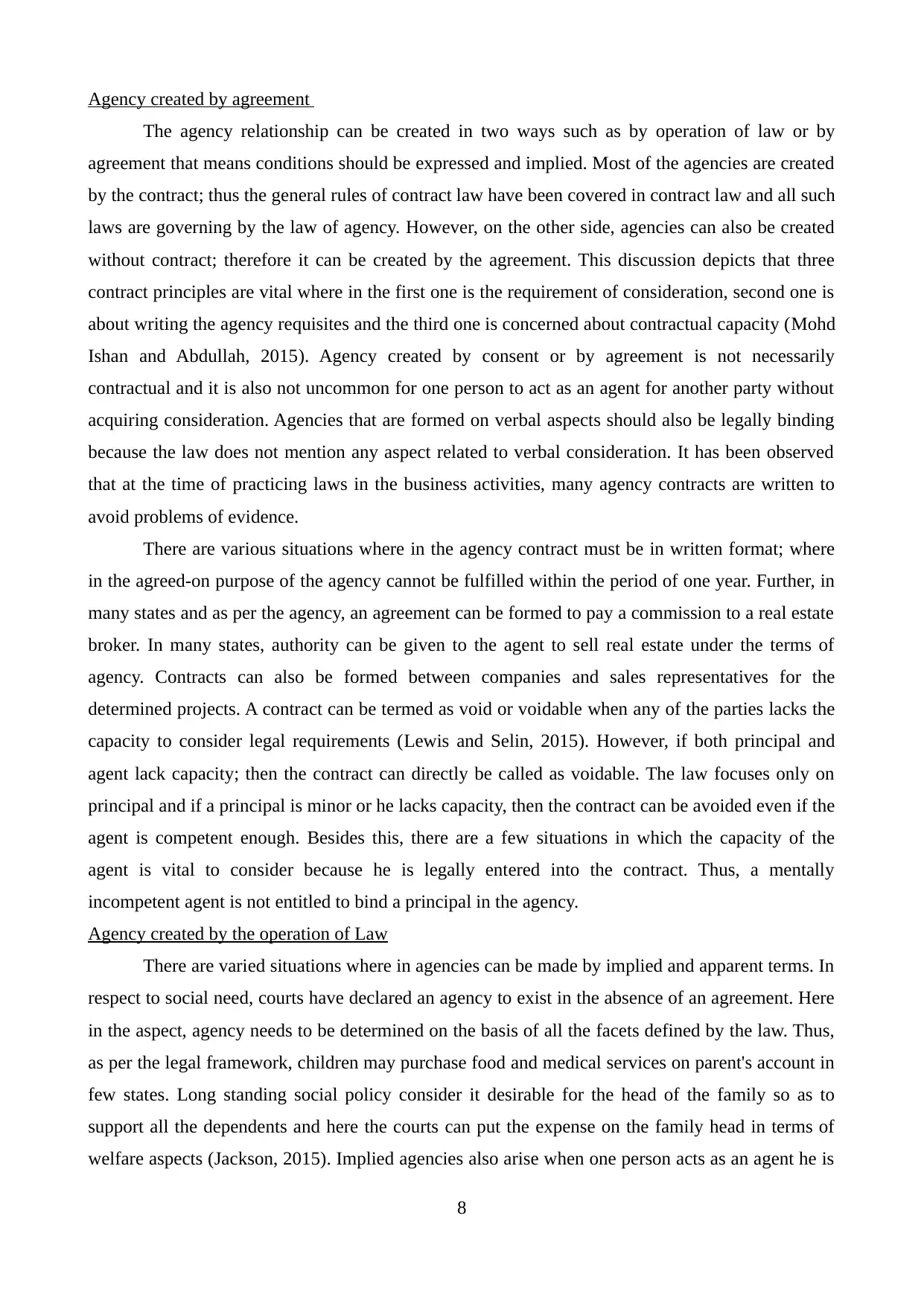
Agency created by agreement
The agency relationship can be created in two ways such as by operation of law or by
agreement that means conditions should be expressed and implied. Most of the agencies are created
by the contract; thus the general rules of contract law have been covered in contract law and all such
laws are governing by the law of agency. However, on the other side, agencies can also be created
without contract; therefore it can be created by the agreement. This discussion depicts that three
contract principles are vital where in the first one is the requirement of consideration, second one is
about writing the agency requisites and the third one is concerned about contractual capacity (Mohd
Ishan and Abdullah, 2015). Agency created by consent or by agreement is not necessarily
contractual and it is also not uncommon for one person to act as an agent for another party without
acquiring consideration. Agencies that are formed on verbal aspects should also be legally binding
because the law does not mention any aspect related to verbal consideration. It has been observed
that at the time of practicing laws in the business activities, many agency contracts are written to
avoid problems of evidence.
There are various situations where in the agency contract must be in written format; where
in the agreed-on purpose of the agency cannot be fulfilled within the period of one year. Further, in
many states and as per the agency, an agreement can be formed to pay a commission to a real estate
broker. In many states, authority can be given to the agent to sell real estate under the terms of
agency. Contracts can also be formed between companies and sales representatives for the
determined projects. A contract can be termed as void or voidable when any of the parties lacks the
capacity to consider legal requirements (Lewis and Selin, 2015). However, if both principal and
agent lack capacity; then the contract can directly be called as voidable. The law focuses only on
principal and if a principal is minor or he lacks capacity, then the contract can be avoided even if the
agent is competent enough. Besides this, there are a few situations in which the capacity of the
agent is vital to consider because he is legally entered into the contract. Thus, a mentally
incompetent agent is not entitled to bind a principal in the agency.
Agency created by the operation of Law
There are varied situations where in agencies can be made by implied and apparent terms. In
respect to social need, courts have declared an agency to exist in the absence of an agreement. Here
in the aspect, agency needs to be determined on the basis of all the facets defined by the law. Thus,
as per the legal framework, children may purchase food and medical services on parent's account in
few states. Long standing social policy consider it desirable for the head of the family so as to
support all the dependents and here the courts can put the expense on the family head in terms of
welfare aspects (Jackson, 2015). Implied agencies also arise when one person acts as an agent he is
8
The agency relationship can be created in two ways such as by operation of law or by
agreement that means conditions should be expressed and implied. Most of the agencies are created
by the contract; thus the general rules of contract law have been covered in contract law and all such
laws are governing by the law of agency. However, on the other side, agencies can also be created
without contract; therefore it can be created by the agreement. This discussion depicts that three
contract principles are vital where in the first one is the requirement of consideration, second one is
about writing the agency requisites and the third one is concerned about contractual capacity (Mohd
Ishan and Abdullah, 2015). Agency created by consent or by agreement is not necessarily
contractual and it is also not uncommon for one person to act as an agent for another party without
acquiring consideration. Agencies that are formed on verbal aspects should also be legally binding
because the law does not mention any aspect related to verbal consideration. It has been observed
that at the time of practicing laws in the business activities, many agency contracts are written to
avoid problems of evidence.
There are various situations where in the agency contract must be in written format; where
in the agreed-on purpose of the agency cannot be fulfilled within the period of one year. Further, in
many states and as per the agency, an agreement can be formed to pay a commission to a real estate
broker. In many states, authority can be given to the agent to sell real estate under the terms of
agency. Contracts can also be formed between companies and sales representatives for the
determined projects. A contract can be termed as void or voidable when any of the parties lacks the
capacity to consider legal requirements (Lewis and Selin, 2015). However, if both principal and
agent lack capacity; then the contract can directly be called as voidable. The law focuses only on
principal and if a principal is minor or he lacks capacity, then the contract can be avoided even if the
agent is competent enough. Besides this, there are a few situations in which the capacity of the
agent is vital to consider because he is legally entered into the contract. Thus, a mentally
incompetent agent is not entitled to bind a principal in the agency.
Agency created by the operation of Law
There are varied situations where in agencies can be made by implied and apparent terms. In
respect to social need, courts have declared an agency to exist in the absence of an agreement. Here
in the aspect, agency needs to be determined on the basis of all the facets defined by the law. Thus,
as per the legal framework, children may purchase food and medical services on parent's account in
few states. Long standing social policy consider it desirable for the head of the family so as to
support all the dependents and here the courts can put the expense on the family head in terms of
welfare aspects (Jackson, 2015). Implied agencies also arise when one person acts as an agent he is
8

authorized by the principal. Weingart v. Directoire Restaurant, Inc is the instance of implied agency.
On the other hand, apparent agency is the one where in the agent has the authority to act on behalf
of the principal. Roles and responsibilities are also defined in adequate way as per the legal
framework.
9
On the other hand, apparent agency is the one where in the agent has the authority to act on behalf
of the principal. Roles and responsibilities are also defined in adequate way as per the legal
framework.
9
⊘ This is a preview!⊘
Do you want full access?
Subscribe today to unlock all pages.

Trusted by 1+ million students worldwide
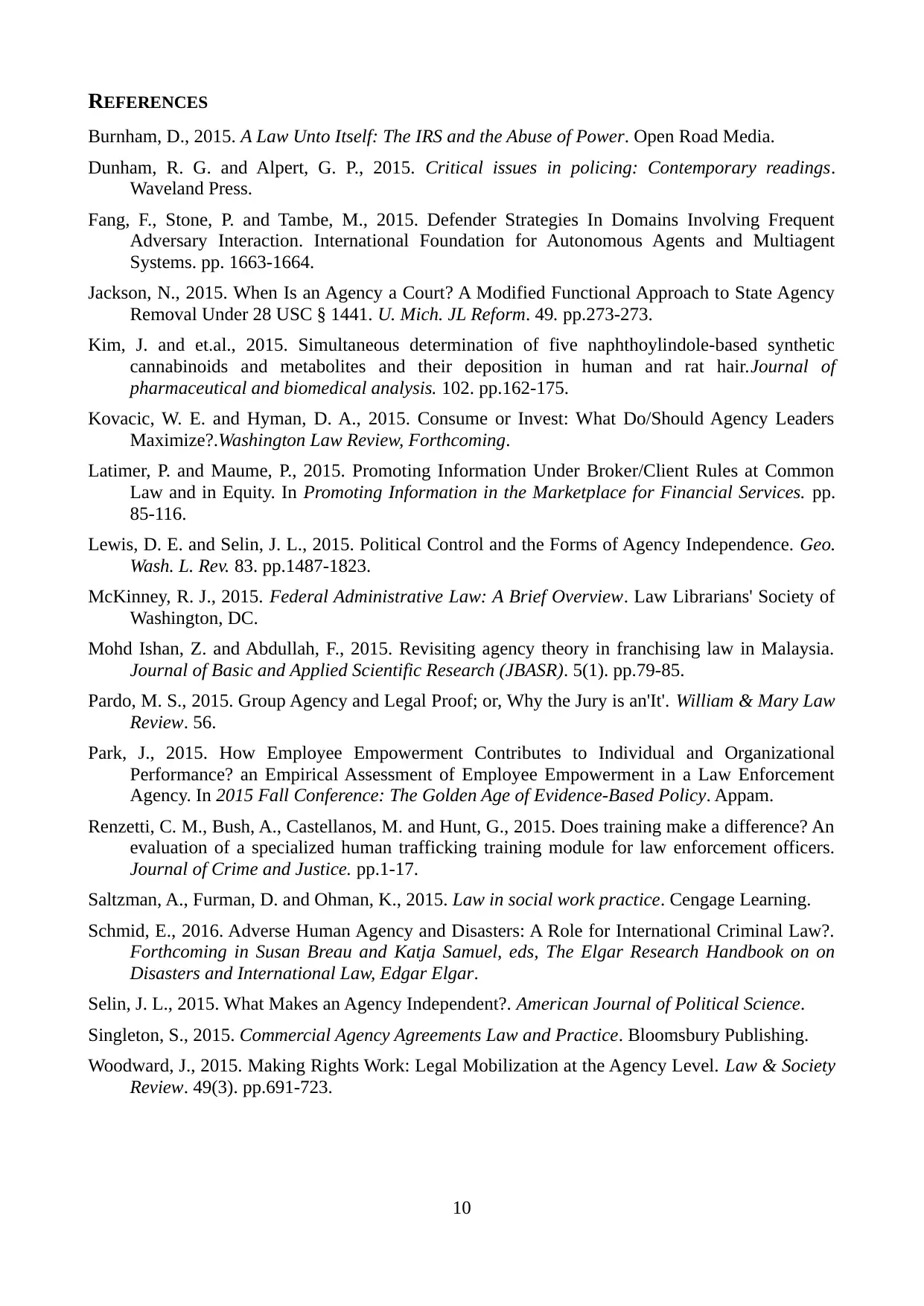
REFERENCES
Burnham, D., 2015. A Law Unto Itself: The IRS and the Abuse of Power. Open Road Media.
Dunham, R. G. and Alpert, G. P., 2015. Critical issues in policing: Contemporary readings.
Waveland Press.
Fang, F., Stone, P. and Tambe, M., 2015. Defender Strategies In Domains Involving Frequent
Adversary Interaction. International Foundation for Autonomous Agents and Multiagent
Systems. pp. 1663-1664.
Jackson, N., 2015. When Is an Agency a Court? A Modified Functional Approach to State Agency
Removal Under 28 USC § 1441. U. Mich. JL Reform. 49. pp.273-273.
Kim, J. and et.al., 2015. Simultaneous determination of five naphthoylindole-based synthetic
cannabinoids and metabolites and their deposition in human and rat hair.Journal of
pharmaceutical and biomedical analysis. 102. pp.162-175.
Kovacic, W. E. and Hyman, D. A., 2015. Consume or Invest: What Do/Should Agency Leaders
Maximize?.Washington Law Review, Forthcoming.
Latimer, P. and Maume, P., 2015. Promoting Information Under Broker/Client Rules at Common
Law and in Equity. In Promoting Information in the Marketplace for Financial Services. pp.
85-116.
Lewis, D. E. and Selin, J. L., 2015. Political Control and the Forms of Agency Independence. Geo.
Wash. L. Rev. 83. pp.1487-1823.
McKinney, R. J., 2015. Federal Administrative Law: A Brief Overview. Law Librarians' Society of
Washington, DC.
Mohd Ishan, Z. and Abdullah, F., 2015. Revisiting agency theory in franchising law in Malaysia.
Journal of Basic and Applied Scientific Research (JBASR). 5(1). pp.79-85.
Pardo, M. S., 2015. Group Agency and Legal Proof; or, Why the Jury is an'It'. William & Mary Law
Review. 56.
Park, J., 2015. How Employee Empowerment Contributes to Individual and Organizational
Performance? an Empirical Assessment of Employee Empowerment in a Law Enforcement
Agency. In 2015 Fall Conference: The Golden Age of Evidence-Based Policy. Appam.
Renzetti, C. M., Bush, A., Castellanos, M. and Hunt, G., 2015. Does training make a difference? An
evaluation of a specialized human trafficking training module for law enforcement officers.
Journal of Crime and Justice. pp.1-17.
Saltzman, A., Furman, D. and Ohman, K., 2015. Law in social work practice. Cengage Learning.
Schmid, E., 2016. Adverse Human Agency and Disasters: A Role for International Criminal Law?.
Forthcoming in Susan Breau and Katja Samuel, eds, The Elgar Research Handbook on on
Disasters and International Law, Edgar Elgar.
Selin, J. L., 2015. What Makes an Agency Independent?. American Journal of Political Science.
Singleton, S., 2015. Commercial Agency Agreements Law and Practice. Bloomsbury Publishing.
Woodward, J., 2015. Making Rights Work: Legal Mobilization at the Agency Level. Law & Society
Review. 49(3). pp.691-723.
10
Burnham, D., 2015. A Law Unto Itself: The IRS and the Abuse of Power. Open Road Media.
Dunham, R. G. and Alpert, G. P., 2015. Critical issues in policing: Contemporary readings.
Waveland Press.
Fang, F., Stone, P. and Tambe, M., 2015. Defender Strategies In Domains Involving Frequent
Adversary Interaction. International Foundation for Autonomous Agents and Multiagent
Systems. pp. 1663-1664.
Jackson, N., 2015. When Is an Agency a Court? A Modified Functional Approach to State Agency
Removal Under 28 USC § 1441. U. Mich. JL Reform. 49. pp.273-273.
Kim, J. and et.al., 2015. Simultaneous determination of five naphthoylindole-based synthetic
cannabinoids and metabolites and their deposition in human and rat hair.Journal of
pharmaceutical and biomedical analysis. 102. pp.162-175.
Kovacic, W. E. and Hyman, D. A., 2015. Consume or Invest: What Do/Should Agency Leaders
Maximize?.Washington Law Review, Forthcoming.
Latimer, P. and Maume, P., 2015. Promoting Information Under Broker/Client Rules at Common
Law and in Equity. In Promoting Information in the Marketplace for Financial Services. pp.
85-116.
Lewis, D. E. and Selin, J. L., 2015. Political Control and the Forms of Agency Independence. Geo.
Wash. L. Rev. 83. pp.1487-1823.
McKinney, R. J., 2015. Federal Administrative Law: A Brief Overview. Law Librarians' Society of
Washington, DC.
Mohd Ishan, Z. and Abdullah, F., 2015. Revisiting agency theory in franchising law in Malaysia.
Journal of Basic and Applied Scientific Research (JBASR). 5(1). pp.79-85.
Pardo, M. S., 2015. Group Agency and Legal Proof; or, Why the Jury is an'It'. William & Mary Law
Review. 56.
Park, J., 2015. How Employee Empowerment Contributes to Individual and Organizational
Performance? an Empirical Assessment of Employee Empowerment in a Law Enforcement
Agency. In 2015 Fall Conference: The Golden Age of Evidence-Based Policy. Appam.
Renzetti, C. M., Bush, A., Castellanos, M. and Hunt, G., 2015. Does training make a difference? An
evaluation of a specialized human trafficking training module for law enforcement officers.
Journal of Crime and Justice. pp.1-17.
Saltzman, A., Furman, D. and Ohman, K., 2015. Law in social work practice. Cengage Learning.
Schmid, E., 2016. Adverse Human Agency and Disasters: A Role for International Criminal Law?.
Forthcoming in Susan Breau and Katja Samuel, eds, The Elgar Research Handbook on on
Disasters and International Law, Edgar Elgar.
Selin, J. L., 2015. What Makes an Agency Independent?. American Journal of Political Science.
Singleton, S., 2015. Commercial Agency Agreements Law and Practice. Bloomsbury Publishing.
Woodward, J., 2015. Making Rights Work: Legal Mobilization at the Agency Level. Law & Society
Review. 49(3). pp.691-723.
10
1 out of 10
Related Documents
Your All-in-One AI-Powered Toolkit for Academic Success.
+13062052269
info@desklib.com
Available 24*7 on WhatsApp / Email
![[object Object]](/_next/static/media/star-bottom.7253800d.svg)
Unlock your academic potential
Copyright © 2020–2026 A2Z Services. All Rights Reserved. Developed and managed by ZUCOL.





